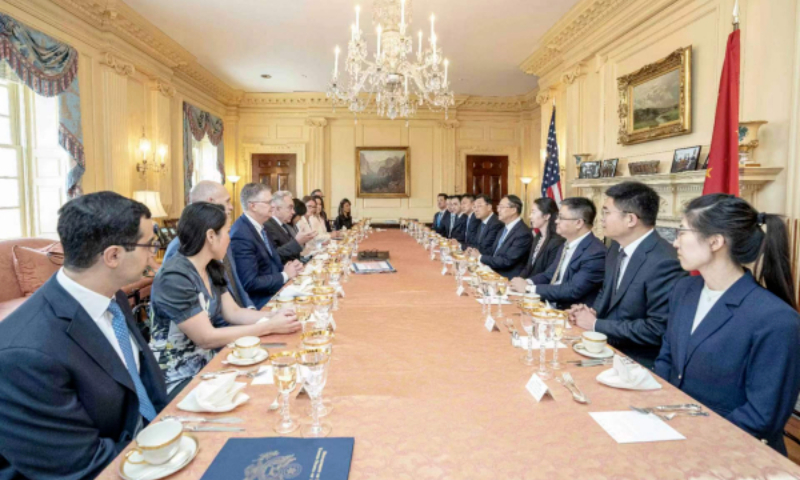China-US relations are at a critical stage of preventing deterioration and promoting stability: Ma Zhaoxu

Photo: fmprc.gov.cn
China-US relations are at a critical stage of preventing deterioration and promoting stability and the US' approach of seeking dialogue while harming China's interests is unworkable. There is no future in zero-sum games under the guise of competition, and China will not accept suppression or deprivation of its legitimate development rights, Chinese Vice Foreign Minister Ma Zhaoxu said while holding consultations with US Deputy Secretary of State Kurt Campbell in Washington on Thursday local time.
Ma is paying a visit to the US from Thursday to June 2 at the latter's invitation.
According to a release from the Chinese side on Friday, during Ma's consultations with Campbell, both sides had a candid and in-depth exchange of views on China-US relations and international and regional issues of mutual concern. The talks were described as constructive.
Ma said that the bilateral relations are at a critical stage of preventing further deterioration and promoting stability. Implementing the important consensus reached at the meeting between the two heads of state in San Francisco last November, further stabilizing and developing China-US relations, is in the interests of both countries and is a common expectation of the international community.
The US should meet China halfway and implement President Biden's commitments. China is committed to stabilizing and developing China-US relations while firmly safeguarding its national sovereignty, security, and development interests, said Ma.
The US' approach of seeking dialogue and cooperation while harming China's interests is unworkable. There is no future in zero-sum games under the guise of competition, and China will not accept suppression or deprivation of its legitimate development rights, Ma said.
During the meeting, Ma also emphasized that the Taiwan question is the first red line that must not be crossed in China-US relations, and that it is the most important and sensitive question. "Taiwan independence" and peace in the Taiwan Straits are incompatible. If the US truly wants peace and stability in the Taiwan Straits, it should adhere to the one-China principle and the three China-US joint communiqués, and fulfill its commitment not to support "Taiwan independence."
Ma noted that the so-called "small yard, high fence" strategy by the US has become an "iron curtain." China urges the US to stop politicizing economic, trade, and technological issues, stop hyping the so-called "overcapacity" topic, cancel the tariffs on Chinese products, and lift illegal unilateral sanctions against Chinese enterprises.
Ma also expounded China's position on the South China Sea issue, saying that maintaining peace and stability in the South China Sea is in the common interests of regional countries and all parties. The US should stop encouraging and supporting infringing provocations, stop creating confrontations in the Asia-Pacific region, and stop deploying ground-based intermediate-range missiles. The US should take concrete actions to maintain regional peace and development momentum.
According to the release from the Chinese side, during the consultations, both sides agreed to continue implementing the important consensus reached at the San Francisco meeting between the two heads of state, stabilize and develop China-US relations, maintain high-level exchanges and communication at all levels, utilize diplomatic consultation mechanisms, recognize the progress made in the first meeting of the China-US intergovernmental dialogue on artificial intelligence (AI), continue to strengthen dialogue in the AI field, and promote personnel exchanges and cultural interactions.
The two sides also discussed international and regional issues concerning Ukraine, the Middle East, and the Korean Peninsula.
Ma emphasized that China firmly opposes the US spreading false information and making accusations against China on the Ukraine issue. China will firmly safeguard its interests, and demands that the US stop smearing and pressuring China, stop imposing unilateral sanctions on Chinese companies, and play a constructive role in resolving the Ukraine crisis.
Global Times
